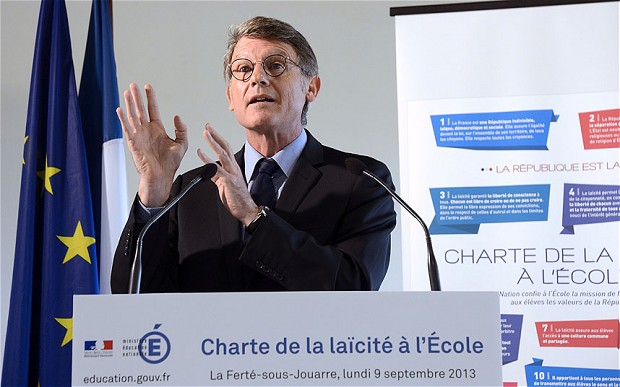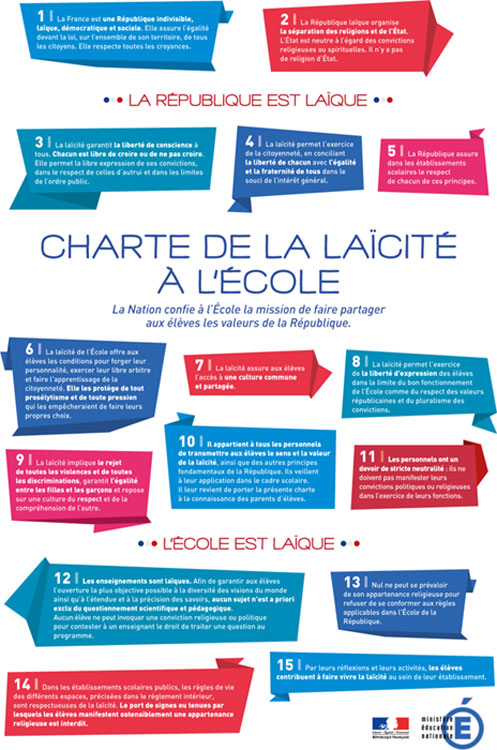France: A “Secularism Charter” in Every School
The French government has announced a plan to post a “secularism charter” in all public schools in France by the end of September.
France: A “Secularism Charter” in Every School
Soeren Kern | Gatestone Institute | August 30, 2013
The French government has announced a plan to post a “secularism charter” in all public schools in France by the end of September.
The document — which is to appear in a prominent location in all of the 55,000 public schools in France — would serve to remind students and teachers of a list of secular principles underpinning the separation of mosque and state.
Although the initiative has enjoyed a generally positive reception, many observers are saying they doubt the Socialist government of French President François Hollande will have the political willpower actually to enforce secular principles in French schools — with or without a charter.
This skepticism stems from the circumstance that Muslim children constitute an increasingly large proportion of the 10 million students in the French public school system — and because Muslim parents make up an increasingly important voting bloc in French politics. Muslims, in fact, cast the deciding vote that thrust Hollande into the Elysée Palace in May 2012.
French Education Minister Vincent Peillon, who announced the plan in an interview with the French daily newspaper L’Est Républicain on August 26, said, “Everyone is entitled to his opinion, but not to dispute lessons or to skip classes [for religious reasons]. The charter will be a reminder of [secular] principles. It will be posted in all schools in late September. The law provides for a moral and civic education that promotes freedom from judgment, the capacity to emancipate, and rights and duties. I want to see the return of those values of the [French] Republic in schools in 2013.”
Although the final content of the charter will not be made public until the middle of September, a draft of the list which contains a total of 17 paragraphs has been circulating since July 11.
The first section of the draft list is entitled “The Republic is Secular,” and consists of six rather straightforward paragraphs that mostly echo the French Constitution. Paragraph 2 of the draft, for example, states that, “France is a republic that is indivisible, secular, democratic and social. It ensures equality before the law, on the whole of its territory, for all citizens. It respects all creeds.”
According to Paragraph 3, “The secular Republic is based upon the separation of religion and state. The state is neutral with regard to religious or spiritual beliefs. There is no state religion.” Paragraph 4 states that “Secularism guarantees freedom of conscience for all. Everyone is free to believe or not to believe. It allows the free expression of his beliefs, respecting those of others within the limits of public order.” And so on.
The second section of the list, entitled “The School is Secular,” changes tack by directly confronting Muslim students who take to disrupting classes whenever they do not agree with their teachers on certain subjects.
Paragraph 14 states: “Lessons are secular. To ensure that students are as objectively open as possible to the diversity of worldviews as well as to the extent and accuracy of knowledge, no subject is a priori excluded from scientific and educational inquiry.”
According to Paragraph 15, “No student may invoke religious or political convictions to challenge and/or to prevent a teacher from teaching certain parts of the curriculum.” Paragraph 16 states that “the wearing of conspicuous symbols or dress by pupils as relates to their religious affiliation is prohibited in public schools.”
The draft charter also states that “the secular school offers students the conditions to forge their own personality, exercise their free will and learn about citizenship. It protects them from proselytizing and from any pressure that prevents them from making their own choices.”
Reactions to the announcement have been mixed, with some questioning if or how the measure will be enforced.
The Secretary General of the French Teachers Union, Philippe Tournier, told Radio Europe 1 that while he welcomed the secularism charter in principle, he worried about its implementation. “The intentions are quite positive, but the essential thing still remains: putting into force what [the charter] affirms,” he said. “Nothing could be worse than posting a secularism charter on the wall, and then the students see around them that what actually happens in school life is the exact opposite of what we tell them.”
A teacher named Yvon from the town of Les Mureaux in north-central France, who was also interviewed by Radio Europe 1, said he hoped the measure was not just a political gimmick. “If it is a charter posted on the wall, teachers must be encouraged to enforce it in their daily classes,” he said.
Peillon’s predecessor as Education Minister, Luc-Marie Chatel, from the main opposition party in France, the center-right Union for a Popular Movement (UMP), expressed his tentative support for the charter: “I think it is a good idea. Any time we can give children a point of reference as to what the French Republic is, and what our values are, that is a good thing.”
But UMP Chairwoman Michèle Tabarot accused the Hollande government of “lacking determination” when it comes to enforcing the separation of mosque and state.
In a statement, Tabarot said the “the reality is that in recent years, the Left has singularly lacked courage in the difficult fight to defend secularism. This is demonstrated by the fact that the current majority [in parliament] refused to pass the law banning the wearing of full face veils in public places when it was in opposition.”
Tabarot was referring to the burqa ban, which was approved by the French Parliament in July 2010, even though most members of the opposition (Socialists, Communists and Greens) voted against the measure.
According to Tabarot, “Recently, the government has also refused to legislate a ban on wearing conspicuous signs in private nurseries. Once again, the French can therefore only see the intolerable gap between the words and deeds of the governing majority.”
This is the second time in recent months that Peillon has courted controversy with a plan to reinforce secular values in French schools.
In April, Peillon announced a project for students in primary and secondary schools to debate “secular morality” [morale laïque] for one hour every week beginning in September 2015.
Peillon’s original plan was for the subject to be taught as a separate subject with dedicated teachers. But after a wave of opposition from teachers, the plan was watered down, and discussion of secular values will now take the form of debates rather than formal teaching. Teachers will be given special training on how to lead debates on issues in which Islam takes a different position, and students will be evaluated individually based on their knowledge and behavior.
The debate over secularism in France has continued throughout 2013:
In August, the High Council of Integration [HCI], a government-funded research institute, recommended that the wearing of religious symbols — such as crucifixes, Jewish skullcaps and Muslim headscarves — should be banned in French universities to ease the “escalating religious tensions in all areas of university life.”
In a 54-page report (PDF here), HCI says its research has shown that some universities have experienced problems from demands to be “excused from attendance for religious reasons…for separation of the sexes in lectures and seminars, instances of proselytizing, disagreements over the curriculum, and the wearing of religious clothes and symbols.”
A law passed in 2004 prohibits the wearing or open display of religious symbols in all French schools and colleges, but does not apply to universities.
In January, a 24-year-old Tunisian student at the University of Nantes in western France was asked by her professor to remove her remove her hijab when she arrived for class. After she refused, the professor asked her to leave the lecture. The student went immediately to complain to officials in the Faculty of Sciences; the professor was forced to apologize to the student.
In July, hundreds of Muslims in Paris went on a rioting spree to protest the enforcement of the burqa ban after police checked the identity of a Muslim woman who was illegally wearing a full-face Islamic veil in public. A similar outbreak of unrest occurred in June, when police stopped a 25-year-old woman for wearing a veil in Argenteuil, a suburb 12 kilometers (8 miles) northwest of Paris.
In March, a school in the town of Arveyres in south-western France said it would no longer offer a meat alternative to students who do not eat pork. According to French television TF1, 28 of the 180 children attending the school used to be offered a substitute meat when pork was on the menu.
The mayor of Arveyres, Benoît Gheysens, said the move was taken because of the cost of providing alternative meals, many of which went to waste. “Often children who did not take the substitute dinner complained and did not eat the pork. It distressed the staff to see how much food was wasted,” Gheysens said. Muslim parents were enraged by the decision, and some responded by vandalizing Gheysens’ car and harassing him after hours at his home.
Also in March, an appeals court in Paris overturned the sacking of a nursery school teacher for refusing to take off her Muslim headscarf at work. The landmark ruling involved Fatima Afif, a nursery assistant who was fired in 2008 by Baby Loup, a privately-run daycare center in Yvelines, a suburb of Paris.
Baby Loup has rules requiring its staff to maintain “philosophical, political and denominational neutrality” at work. But the court ruled that because the nursery is a private establishment, and it was not an “urgent professional necessity” that Afif remove her veil, the French “principle of secularism does not apply.” According to the court, the principle cannot be invoked to deny “employees of private companies that do not perform a public service…the protections guaranteed them under the work code.”
According to Eric Rocheblave, an employment lawyer interviewed by the weekly magazine L’Express on March 19, “This ruling is unheard of. It is the first time that the Court de cassation [the highest appeals court in France] has made a judgment on wearing the veil in a company. Therefore, it is a major decision in the context of French legal precedent and jurisprudence. The decision means that now, an employer can only restrict an employee’s religious freedom if the practical functions of the job make it necessary.”
French Interior Minister Manuel Valls condemned the court’s decision, saying, “this puts secularism in France in doubt.” UMP Deputy Eric Ciotti told French Television TF1 that the court’s decision was “a severe blow against secularism” and a victory for “the claims of ethnic groups, to the detriment of republican values.”
The former head of the official Equal Opportunities and Anti-Discrimination Commission, Jeanette Bougrab, told Radio Europe 1 that “This is a dark day for secularism in France…It is like a feeling of mourning. My republic is dying.”
Soeren Kern is a Senior Fellow at the New York-based Gatestone Institute. He is also Senior Fellow for European Politics at the Madrid-based Grupo de Estudios Estratégicos / Strategic Studies Group. Follow him on Facebook and on Twitter.
Link to Original Article: http://www.gatestoneinstitute.org/3955/france-secularism-charter





